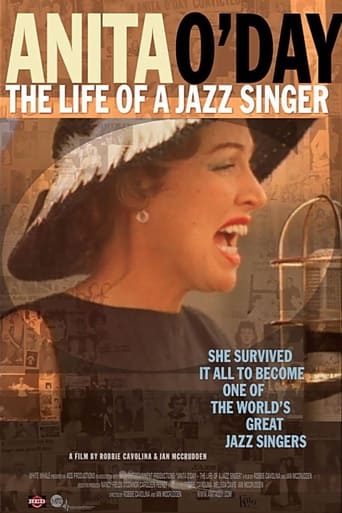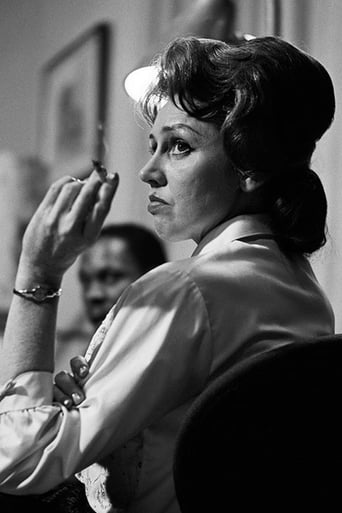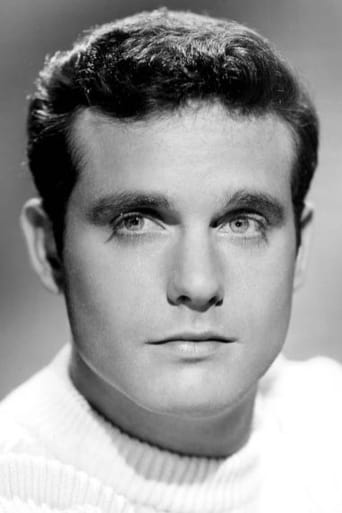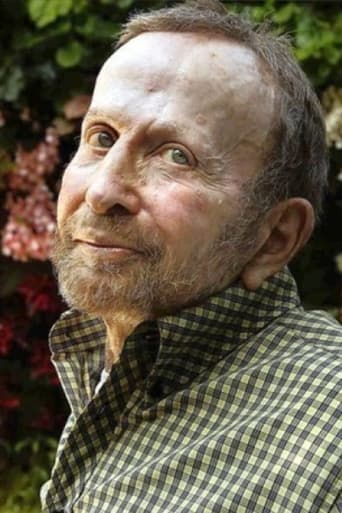Anita O'Day: The Life of a Jazz Singer (2007)
This documentary explores the life of jazz singer Anita O'Day. As a child, Anita had a tonsillectomy, during which her uvula was accidentally removed. The surgery prevents her from singing vibrato and holding long notes, but lends to her much-revered percussive style. Anita overcomes her vocal hurdle, as well as many others -- including poverty, heroin addiction and jail time for a drug arrest -- to become one of the most prolific and respected jazz vocalists of the 20th century. Initial release: 30 April 2007
Watch Trailer
Free Trial Channels
Cast


Reviews
Wow! Such a good movie.
Lack of good storyline.
disgusting, overrated, pointless
Entertaining from beginning to end, it maintains the spirit of the franchise while establishing it's own seal with a fun cast
What a great forgotten talent ...the honesty of her life she presents should be a guide post to young talent and celebrities today. Her wit and wisdom...does not take the edge off what she did and how she did .A true breath of fresh air from truly one of the greats. To be truthful in regards to addiction ... Both hers and many of the Jazz greats that were her contemporaries, was insightful and sincere...with her brand of brashness that i am sure was her trademark. To have that long of a career , to play with most of the greatest in Jazz and to survive..is truly indicative of her stamina and stick to it-ness, that keeps her alive in the hearts of those that knew her and discovered her courtesy of this documentary. Anita's look and rebel attitude strikes familiar ....Mylie Cyrus.
You will find it difficult not to enjoy the story of Ms O'Day's life. She was the ultimate survivor; a solid representative of Tom Brokaw's 'Greatest Generation,' sans the uniformed military service. In the documentary she is shown singing a marvelous rendition of Billie Holiday's composition "Travelin' Light," an appropriate choice because they were birds of a feather in so many ways.The major flaw in the documentary comes from the comments of a couple of individuals interviewed in the film - most notably the daughter of pianist Joe Albany - who give the impression that there is a correlation between the musical freedom in modern jazz (aka 'bebop') and the personal mental "freedom" that Ms O'Day and other musicians derived from narcotics use; that is, the narcotics somehow contributed to Ms O'Day's ability or effectiveness in singing in a "freer" modern style. It's understandable how this correlation can be mistakenly made. It is a charge that has plagued jazz musicians since the birth of the music. And, with the prominent number of modern jazz musicians who either did drugs or were alleged to, most noticeably the undisputed leader of modern jazz, Charlie Parker, one can see how easy it is to conclude there must be some truth that the drugs somehow aided the playing.Pianist Joe Albany experienced a similar extended drug addiction as did Ms. O'Day, so I fully respect the opinion of his daughter regarding drug use by musicians during this era. She speaks from the inside. However, it was Parker himself on several well known occasions who dismissed the idea that drug use somehow enhanced or benefited his playing. In addition, there are too many examples of excellent and Hall of Fame level modern jazz musicians who did not succumb to drug use or addiction, yet were able to reach an exceptional playing proficiency.Ms O'Day's drug use seems due more to issues haunting her from her fractured childhood and adult interpersonal relationships as well as the inevitable pressures that come with a career as a public performer, more so than anything having to do with trying to improve her musicianship. Not surprisingly, this is a consistent theme for drug use by all demographic and socio-economic groups, be they jazz musicians or not. For most of these individuals, the "freedom" drugs provide is from the anxieties and pain associated with bad relationships and work and living pressures - the drugs provide no direct aide to learning or playing the music.Performance pressures are often underestimated, but can be insidious. Singer Jeri Southern, for example, suffered deteriorating health from extreme anxiety attacks resulting from her fear of performing in public. Her problem was so overwhelming that at age 35, while still near the height of her popularity, she completely retired from performing and returned home to Nebraska for a more quiet life away from the music performance stage. Maybe an argument can be made that once drugs have been used to suppress the anxieties and pain, the musician is then 'freer' to concentrate on the music unencumbered. Maybe so. But the implication that drug use directly aided in the improved facilitation of the music is inaccurate and should not have been implied in the film with regards to Ms O'Day, since it is a misnomer musicians have been battling for decades. Jazz musicians who took drugs largely did so for the same reasons others in our society took drugs: to suppress anxieties, pressures, and pain brought about by a variety of individual experiences.
This is a marvelous film, a worthy tribute to one of the giants of jazz. I was a bit worried at the gimmicky opening -- in which a clip of Anita O'Day was subjected to bizarre color patterns, mirror images and re-editing -- but as the film went on it settled into a conventional but appealing music-documentary groove with O'Day's interviews (some archival, some done especially for this film) providing commentary and context to her career. Filmmakers Robbie Cavolina and Ian McCrudden deserve credit for presenting O'Day's performances, if not as complete songs start-to-finish, at least in long enough clips so you could appreciate her (all too many music documentarians just give us a few seconds here and there, or have people talking over the clips). Though this film is aimed mostly at O'Day's fans, "newbies" can watch it and at least get an idea of what made her so great.One aspect of the film that fascinated me was O'Day's comment that in order to be a great jazz musician you had to live the "jazz life." I can think of quite a few people on her level of talent -- Louis Armstrong, Duke Ellington, Lionel Hampton, Ella Fitzgerald, Dizzy Gillespie -- who had long and prosperous careers by avoiding substance abuse and the other pitfalls of the so-called "jazz life." The only part of the movie that really rubbed me the wrong way, though, was the interview clip with the late Leonard Feather (with which the filmmakers seemed to agree) in which he said that O'Day was the only white woman jazz singer he regarded as the artistic equal of Billie Holiday, Ella Fitzgerald or Sarah Vaughan. What about June Christy, Chris Connor, Peggy Lee or -- in the generation just before O'Day's -- Mildred Bailey (an obvious influence on O'Day's style) and the Boswell Sisters?
I saw this tonight at the Tribeca Film Festival in New York City.Anita O'Day's story was well documented in her autobiography "High Times, Hard Times", which is respected for its unflinching candor. The best feature of this documentary is the clips of Anita's performances, many of which have never been seen before. It includes, of course, her landmark performance of 'Sweet Georgia Brown' from the 1958 Newport Jazz Festival, and several other performances that evidence her right to be considered one of jazz's finest vocalists. In addition to these clips there are interviews with jazz luminaries including George Wein (legendary founder of the Newport Jazz Festival), Margaret Whiting, and Dr. Billy Taylor. These experts credibly testify about Anita's genius and her standing relative to other jazz singers who obtained greater celebrity, such as Billie Holiday, Ella Fitzgerald, and Sarah Vaughn.This documentary does not provide new information about either Anita's private life or career, but it is important as a tribute to a singer whose talent justified greater acclaim than she received.








